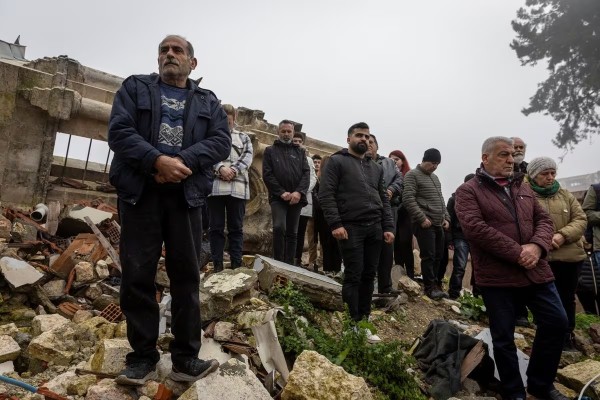
Worshippers attend a mass for those of their community killed by last year's earthquake at Greek Orthodox Church which was also destroyed by the quake in Antakya's historical city center, in Hatay, Turkey, February 6, 2024. The magnitude 7.8 tremor that struck in the early hours of Feb. 6, 2023, levelled towns and city swathes in the country's southeast. It killed more than 53,000 people in Turkey and nearly 6,000 in neighbouring Syria and left millions homeless. REUTERS/Umit Bektas
Ishtartv.com
- reuters.com
By Burcu Karakas and Ceyda Caglayan, February
6, 2024
ANTAKYA, Turkey, Feb 6 (Reuters) - The Antioch
Greek Orthodox Church brought Christians together in Turkey's Antakya for
centuries until last year, when an earthquake killed dozens of them and sent
hundreds more fleeing.
Though it now lies in ruins, many pray it will
again bring them back.
"Our churches are levelled and our bell towers
are silent," Fadi Hurigil, head of the Greek Orthodox Church Foundation of
Antakya, said on Tuesday at a mass held for victims of the 7.8 magnitude quake
that devastated southern Turkey and northwestern Syria on Feb. 6 last year.
The deadliest disaster in modern Turkey's
history, the quake killed more than 53,000 people in Turkey and nearly 6,000 in
Syria, and left millions homeless. It also ravaged the rich cultural and religious
heritage of Antakya, which was once called Antioch and founded in 300 BC by the
Seleucid dynasty.
The ancient city, home to Jews, Christians and
Muslims, changed hands over the centuries between Greeks, Romans, Arabs and
Ottoman Turks.
Those gathered at the church prayed in Arabic
and Turkish for the 63 people from the local Christian community who died.
Icons, crucifixes and liturgical vessels have
since been recovered from the church's wreckage and entrusted to the Hatay
Archeology Museum, Hurigil said. Some remain under the rubble.
"I saw the church for the first time after the
earthquake and I couldn't believe my eyes (at the scale of the devastation). I
was deeply affected," said Larina Balikcioglu, 18, a medical student who
attended the mass.
But now the Antioch Greek Orthodox Church -
which was similarly destroyed by an earthquake in 1872 but later restored by
Russian architects - is set for another rebirth as a project to restore it has
been approved. Construction work is awaiting the results of a soil survey.
"This city has been destroyed and rebuilt seven
times. It was demolished for the eighth time, and hopefully, it will be rebuilt
again," Hurigil said, referring to other earthquakes that have rattled a
region sitting atop a geological fault line.
'PLEASE COME BACK'
Some 370 Greek Orthodox families were living in
Antakya before the 2023 quake but only 20 remain today, he told Reuters.
Hurigil, 49, born and raised in Antakya, said
45 families had relocated to Mersin province, a three-hour drive away.
Although his own family home in the city centre
was only slightly damaged by the quake, they are currently staying in their
summer house in Hatay province due to poor living conditions in Antakya.
"Antakya holds a special place in the hearts of
those who had to leave, as it is where they have roots and land. Giving up this
city is not easy for us," he said.
David Cagan, 53, another member of the local
Greek Orthodox community, said it was essential to rebuild the churches. Even
before the quake, he said, Antakya's Christian community had been shrinking
every year in predominantly Muslim Turkey, and the latest disaster has brought
it to the brink of extinction.
"Our house of worship is what unites us, and
without it, we cannot gather," he said, adding that Turkish authorities
and international organisations should promote projects that would encourage
people to return to Antakya.
"We are not going to leave here. The city's soul
is its people. To those who left, I say: please come back."
*Additional reporting by Ali Kucukgocmen;
Editing by Jonathan Spicer and Gareth Jones
|